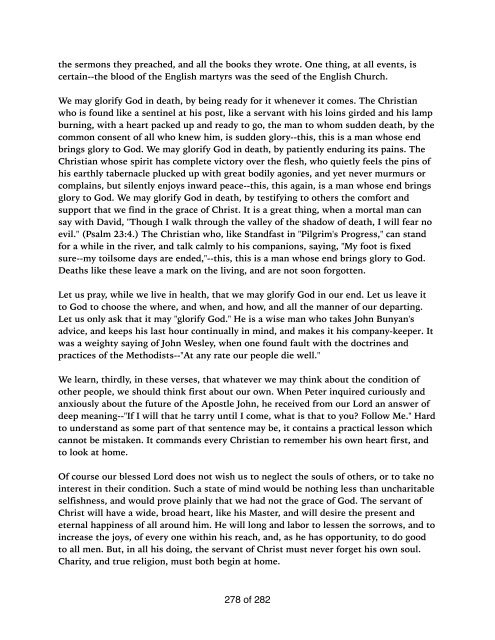The Gospel of John By J.C. ryle
Expository Thoughts on the Gospels Volume 4: John. Ignorance of Scripture is the root of every error in religion, and the source of every heresy. To be allowed to remove a few grains of ignorance, and to throw a few rays of light on God's precious word, is, in my opinion, the greatest honor that can be put on a Christian.
Expository Thoughts on the Gospels Volume 4: John. Ignorance of Scripture is the root of every error in religion, and the source of every heresy. To be allowed to remove a few grains of ignorance, and to throw a few rays of light on God's precious word, is, in my opinion, the greatest honor that can be put on a Christian.
You also want an ePaper? Increase the reach of your titles
YUMPU automatically turns print PDFs into web optimized ePapers that Google loves.
the sermons they preached, and all the books they wrote. One thing, at all events, is<br />
certain--the blood <strong>of</strong> the English martyrs was the seed <strong>of</strong> the English Church.<br />
We may glorify God in death, by being ready for it whenever it comes. <strong>The</strong> Christian<br />
who is found like a sentinel at his post, like a servant with his loins girded and his lamp<br />
burning, with a heart packed up and ready to go, the man to whom sudden death, by the<br />
common consent <strong>of</strong> all who knew him, is sudden glory--this, this is a man whose end<br />
brings glory to God. We may glorify God in death, by patiently enduring its pains. <strong>The</strong><br />
Christian whose spirit has complete victory over the flesh, who quietly feels the pins <strong>of</strong><br />
his earthly tabernacle plucked up with great bodily agonies, and yet never murmurs or<br />
complains, but silently enjoys inward peace--this, this again, is a man whose end brings<br />
glory to God. We may glorify God in death, by testifying to others the comfort and<br />
support that we find in the grace <strong>of</strong> Christ. It is a great thing, when a mortal man can<br />
say with David, "Though I walk through the valley <strong>of</strong> the shadow <strong>of</strong> death, I will fear no<br />
evil." (Psalm 23:4.) <strong>The</strong> Christian who, like Standfast in "Pilgrim's Progress," can stand<br />
for a while in the river, and talk calmly to his companions, saying, "My foot is fixed<br />
sure--my toilsome days are ended,"--this, this is a man whose end brings glory to God.<br />
Deaths like these leave a mark on the living, and are not soon forgotten.<br />
Let us pray, while we live in health, that we may glorify God in our end. Let us leave it<br />
to God to choose the where, and when, and how, and all the manner <strong>of</strong> our departing.<br />
Let us only ask that it may "glorify God." He is a wise man who takes <strong>John</strong> Bunyan's<br />
advice, and keeps his last hour continually in mind, and makes it his company-keeper. It<br />
was a weighty saying <strong>of</strong> <strong>John</strong> Wesley, when one found fault with the doctrines and<br />
practices <strong>of</strong> the Methodists--"At any rate our people die well."<br />
We learn, thirdly, in these verses, that whatever we may think about the condition <strong>of</strong><br />
other people, we should think first about our own. When Peter inquired curiously and<br />
anxiously about the future <strong>of</strong> the Apostle <strong>John</strong>, he received from our Lord an answer <strong>of</strong><br />
deep meaning--"If I will that he tarry until I come, what is that to you? Follow Me." Hard<br />
to understand as some part <strong>of</strong> that sentence may be, it contains a practical lesson which<br />
cannot be mistaken. It commands every Christian to remember his own heart first, and<br />
to look at home.<br />
Of course our blessed Lord does not wish us to neglect the souls <strong>of</strong> others, or to take no<br />
interest in their condition. Such a state <strong>of</strong> mind would be nothing less than uncharitable<br />
selfishness, and would prove plainly that we had not the grace <strong>of</strong> God. <strong>The</strong> servant <strong>of</strong><br />
Christ will have a wide, broad heart, like his Master, and will desire the present and<br />
eternal happiness <strong>of</strong> all around him. He will long and labor to lessen the sorrows, and to<br />
increase the joys, <strong>of</strong> every one within his reach, and, as he has opportunity, to do good<br />
to all men. But, in all his doing, the servant <strong>of</strong> Christ must never forget his own soul.<br />
Charity, and true religion, must both begin at home.<br />
278 <strong>of</strong> 282

















